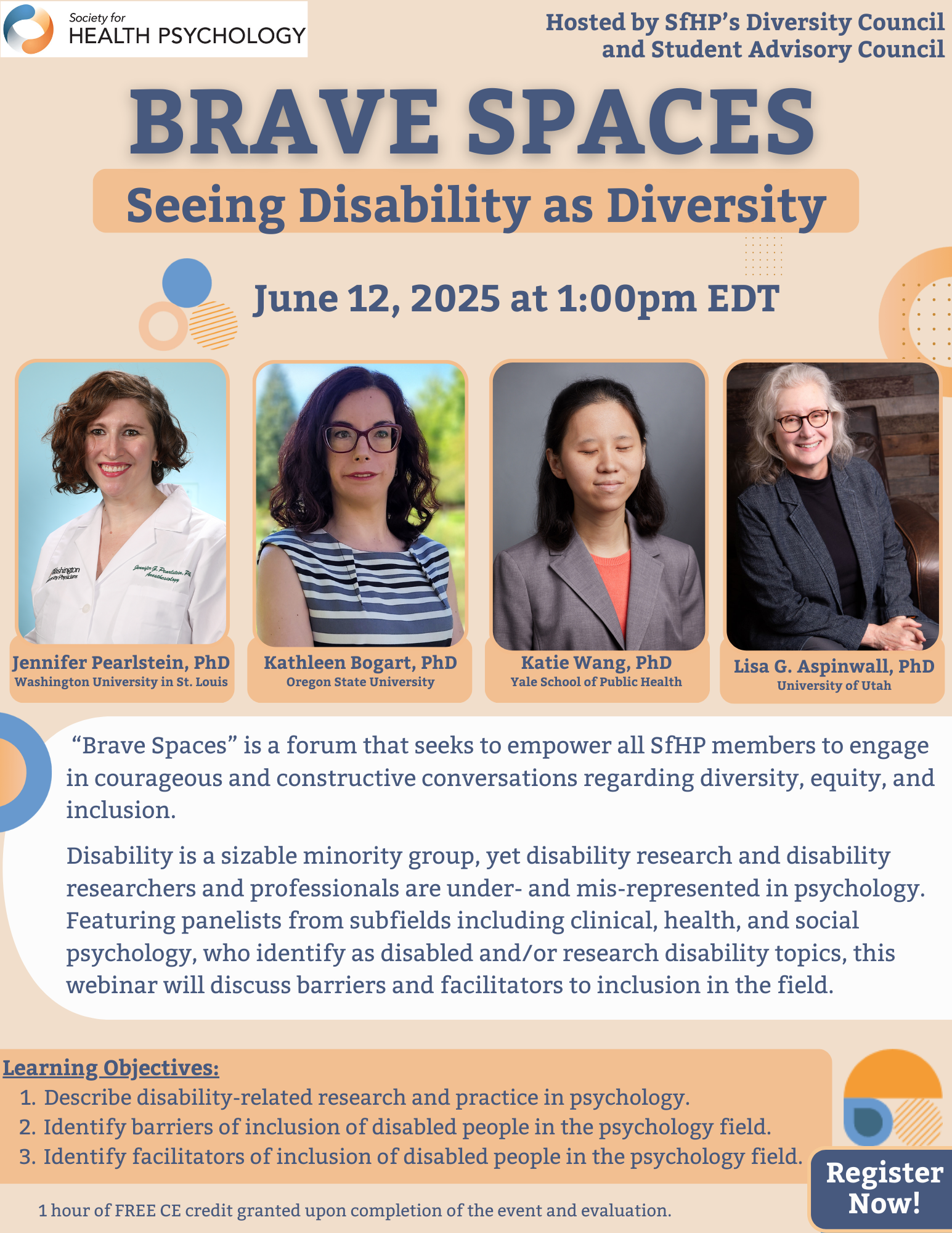SfHP: Brave Spaces: Seeing Disability as Diversity
$50.00
Society for Health Psychology Co-Sponsored Webinar
Presenters:
Jennifer Pearlstein, PhD, Washington University in St. Louis. Dr. Pearlstein is a licensed clinical psychologist and Clinical Assistant Professor in the Department of Anesthesiology at Washington University in St. Louis, where she provides psychological services within the Pain Management Center. Her work is dedicated to advancing mental health care through clinical practice, research, scholarship, and advocacy. As a disabled psychologist, Dr. Pearlstein is committed to disability-affirmative mental health care and training, and she contributes to diverse efforts focused on disability access and inclusion in healthcare and academic settings.
Kathleen Bogart, PhD, Oregon State University. Dr. Bogart is a social/health psychologist specializing in disability, ableism, and rare disorders. She is the co-founder of DARN (Disability Advocacy and Research Network).
Katie Wang, PhD, Yale School of Public Health. Dr. Wang is a social psychologist and an associate professor in the Department of Social and Behavioral Sciences at Yale School of Public Health. Her research focuses on the role of stigma as a social determinant of mental and behavioral health inequities, with a specific emphasis on how ableism intersects with other forms of oppression to impact the health of people with disabilities. Dr. Wang is a member of the Disability Mentoring Advisory Group and the Disability Inclusion Forum Steering Committee within the American Psychological Association and served on the Committee on Disability Issues in Psychology (CDIP) from 2020 to 2022.
Lisa G. Aspinwall, PhD, University of Utah. Dr. Aspinwall is Professor of Psychology and a member of the Cancer Control and Population Sciences program at the Huntsman Cancer Institute at the University of Utah. Her research examines self-regulatory processes and future-oriented thinking as people seek to understand and prevent potential negative outcomes, especially in the domain of health. She is a fellow of APA Divisions 8 and 38, and a co-director of DARN, the Disability Advocacy and Research Network.
Overview:
Disability is a sizable minority group, yet disability research and disability researchers and professionals are under- and mis-represented in psychology. Featuring panelists from subfields including clinical, health, and social psychology, who identify as disabled and/or research disability topics, this webinar will discuss barriers and facilitators to inclusion in the field. The goal of this webinar is to provide an overview of disability in psychology research and practice, and to discuss strategies to increase inclusion in the field for an introductory audience.
Learning Objectives: Intended Audience:
- Describe disability-related research and practice in psychology.
- Identify barriers of inclusion of disabled people in the psychology field.
- Identify facilitators of inclusion of disabled people in the psychology field.
Attendees must attend the entirety of the program and complete the Evaluation sent after the program.
Description
Society for Health Psychology Co-Sponsored Webinar
Presenters:
Jennifer Pearlstein, PhD, Washington University in St. Louis. Dr. Pearlstein is a licensed clinical psychologist and Clinical Assistant Professor in the Department of Anesthesiology at Washington University in St. Louis, where she provides psychological services within the Pain Management Center. Her work is dedicated to advancing mental health care through clinical practice, research, scholarship, and advocacy. As a disabled psychologist, Dr. Pearlstein is committed to disability-affirmative mental health care and training, and she contributes to diverse efforts focused on disability access and inclusion in healthcare and academic settings.
Kathleen Bogart, PhD, Oregon State University. Dr. Bogart is a social/health psychologist specializing in disability, ableism, and rare disorders. She is the co-founder of DARN (Disability Advocacy and Research Network).
Katie Wang, PhD, Yale School of Public Health. Dr. Wang is a social psychologist and an associate professor in the Department of Social and Behavioral Sciences at Yale School of Public Health. Her research focuses on the role of stigma as a social determinant of mental and behavioral health inequities, with a specific emphasis on how ableism intersects with other forms of oppression to impact the health of people with disabilities. Dr. Wang is a member of the Disability Mentoring Advisory Group and the Disability Inclusion Forum Steering Committee within the American Psychological Association and served on the Committee on Disability Issues in Psychology (CDIP) from 2020 to 2022.
Lisa G. Aspinwall, PhD, University of Utah. Dr. Aspinwall is Professor of Psychology and a member of the Cancer Control and Population Sciences program at the Huntsman Cancer Institute at the University of Utah. Her research examines self-regulatory processes and future-oriented thinking as people seek to understand and prevent potential negative outcomes, especially in the domain of health. She is a fellow of APA Divisions 8 and 38, and a co-director of DARN, the Disability Advocacy and Research Network.
Overview:
Disability is a sizable minority group, yet disability research and disability researchers and professionals are under- and mis-represented in psychology. Featuring panelists from subfields including clinical, health, and social psychology, who identify as disabled and/or research disability topics, this webinar will discuss barriers and facilitators to inclusion in the field. The goal of this webinar is to provide an overview of disability in psychology research and practice, and to discuss strategies to increase inclusion in the field for an introductory audience.
Learning Objectives: Intended Audience:
- Describe disability-related research and practice in psychology.
- Identify barriers of inclusion of disabled people in the psychology field.
- Identify facilitators of inclusion of disabled people in the psychology field.
Attendees must attend the entirety of the program and complete the Evaluation sent after the program.




Reviews
There are no reviews yet.